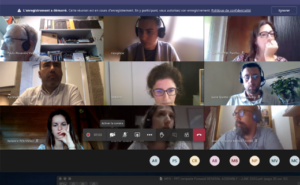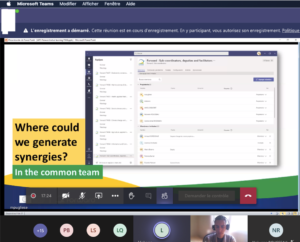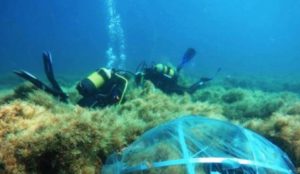Started in January 2019, the diagnosis of the ORs Research and Innovation ecosystems led by Nexa was one of the first steps of the Forward project.
An unprecedent involvement of the OR R&I communities
The analysis was based on a rigorous methodology which related on an intensive desk research, but also an unprecedent involvement of the OR communities : 186 interviews were conducted with regional organizations supervisors as well as with researchers and entrepreneurs, 258 individuals responded to a common survey and 155 participants took part to the different regional workshops.
Evidence-based conclusions to fight against popular beliefs
The main conclusions of the R&I diagnostic in the ORs are :
1 – These territories participate in Framework Programs 7 (127 projects) and Horizon 2020 program (200 projects) in projects at the forefront of global challenges (marine sciences, biodiversity, climate change, health diseases…),
2 – ORs participation is heterogeneous and low
3 – Three factors impede the participation :
– Lack of synergies in public policies
– Lack of a connection strategy towards major European networks
– Organizations/stakeholders don’t apply or don’t have the resources to apply
4 -Each region needs a customized approach to develop actions which address their own obstacles
5 -A joint strategy has been designed within Forward consortium and ambitions to build inclusive growth through knowledge-based economy in ORs
6- OR should join their strengths to reach critical masses and be competitive.
The WP2 implementation faced several challenges
WP2 suffers mainly from the lack of monitoring systems for R&I in the ORs. Also, WP2 was the first technical WP of the project, and there has been a late start of activities’ implementation in some regions. As a consequence, WP2 results were delivered in February 2020 instead of July 2019.
Ongoing update of regional and joint strategies :
The joint strategy and regional action plan need to be updated. 3 steps are foreseen to do so:
• Regional feedbacks about the use of the joint strategy and the implementation of actions will be collected (through a survey targeting WP2 regional delegates).
• A mutual learning workshop with WP2 delegates will be organized in February 2022 to discuss about current situation and prospects
• A report updating the joint strategy and regional action plans will be elaborated.
Within the framework of the 3 promotional videos scheduled for dissemination and communication of FORWARD, CTG (Collectivité Territoriale de Guyane), the French Guianese Work Package Leader has launched the second video.
Focused on each OR’s Research and Innovation potential by introducing their infrastructures, projects or innovative solutions, you can discover in 3 minutes some examples of ORs’ equipment.
ORs play a strategic role for a knowledge-based Europe with its high potential ecosystems.
FORWARD contributes to the improvement of the knowledge of ORs research and innovation ecosystems.
This video showcases 9 examples of ORs’ infrastructures or projects in several fields such as Earth Sciences, Bio-technologies, Bio products, biodiversity, health and digital.
• In Azores, NONAGON is a catalyst of the processes of technological transfer to enable synergies between public and private sectors.
• In Martinique, the Vulcanological Observatory is involved in the implementation of the warning systems for tsunamis and other coastal hazards.
• In Réunion, the Maido Atmospheric Observatory aims to better understand interactions between atmosphere and earth surface, including its emissions.
• In the Canary Islands, the Spanish Bank of Algae identifies and preserves microalgae for innovative agriculture, pharmaceutical and nutraceutical applications.
• In French Guiana, Bio-Stratège is an innovative consultancy firm bringing out the bioactive molecules in plants obtained from Amazonian biodiversity extracts.
• In Madeira, the Ocean Observatory is dedicated to permanent monitoring of marine biodiversity, involving multi-disciplinary groups of researchers.
• In Saint Martin, the construction of the Caribbean Institute of Insular Biodiversity aims at the promotion of eco-responsible tourism to preserve the unique plant and animal biodiversity of the Caribbeans.
• In Guadeloupe, the MALIN project aims to generate knowledge on diseases in the territory, leveraging a high-throughput diagnostic platform to process high numbers of DNA and RNA samples in a reduced time.
• In Mayotte, the region’s Data Centre offers a high level of security without impacting the servers, ensuring unprecedented levels of maintenance operations.
Watch the video 2 on our YouTube channel : https://www.youtube.com/watch?v=upMuXNHO0CE&t=10s
Video 1 : introducing Forward
https://forward-h2020.eu/about-forward/
The video 3 will be available in November 2021.
Stay connected and join-us on social networks
Forward project gathers all the 9 outermost regions. At this step of the project, the work package 3 “co-creation and implementation of thematic action plans” is an important foundation because it brings together experts from the ORs for the first time in thematic working groups.
As a reminder, 8 thematic groups in the following areas met during the KOM. Their fields ; namely,
TWG1 : HEALTH, APPLIED MEDICAL TECHNOLOGIES, DIAGNOSTICS AND THERAPIES
TWG2 : SOCIAL SCIENCES AND SOCIAL INNOVATION
TWG3 : EARTH, SPACE & UNIVERSE SCIENCES
TWG4 : INFORMATION AND COMMUNICATION TECHNOLOGY
TWG5 : CLIMATE CHANGE AND ENERGY TRANSITION
TWG6 : AGRICULTURE, APPLIED LIFE SCIENCES, BIOTECHNOLOGY, BIO-SYSTEMS ENGINEERING
TWG7 : BIODIVERSITY CONSERVATION AND RESTORATION
TWG8 : MARINE SCIENCES AND TECHNOLOGIES
The ultimate goal of these TWG is to increase ORs participation in European calls, in number but also in quality.
Since the Kick-Off Meeting of sub-coordinators, on 17th September 2020, regular working sessions have been organized to ensure the smooth running of the TWG activities.
As a reminder the objectives of the TWG were defined by various phases, which are:
Phase 1: producing a regional diagnosis, comparative analysis and the definition of local and joint strategies;
Phase 2: Building of capacities through thematic working groups, training, networking, consortium building;
Phase 3: Strengthening of the connection between research and policy making and ensuring sustainability and impacts of project results on a long term
We are currently in the third phase, for most of the TWG, which is the implementation of the action plan to foster the collaboration on common area of interest among ORs, with European stakeholders, third countries.
Thanks to survey, interviews and workshop of ORs R&I stakeholders carried out within the Work Package 2, Forward members have a better view, knowledge and needs of their ecosystem. Some ORs have an embryonning research system profile whereas others have more developed one.
The Azorean university has an international attractiveness with its facilities for external researchers, research groups and several skills like energy, biodiversity and tourism. 12 research groups are present in the University of the Azores, the only higher education institution with international network.
In Canary Island, research and technology organization are important as they act as an interface knowledge between producers and users, clusters, technology transfer centres, incubators and support services for innovation. Indeed, the University of La Laguna (ULL) is part of top 3 more institutions in both H2020 (2014-2020) and the 7th Framework program (2007-2013).
The higher involvement of regional stakeholders and connection with experienced FP European peers in Madeira particularly in specific fields such as biotechnology and or information and communication technology has been pointed out by WP2 diagnosis.
Public bodies like INRA (Institut National de Recherche Agronomique) is present since 70 years in Guadeloupe, CIRAD (Centre de coopération internationale en recherche agronomique pour le développement), BRGM (Bureau de Recherche Géologique Minier), IFREMER (Institut Français de Recherche pour l’Exploitation de la Mer), Institut Pasteur.
These establishments are not present in Saint-Martin in the north side, which is particular because of its geopolitical and institutional singularity. Saint-Martin in the North is an Outermost region, in the south an Oversea Country Territory (OCT). Indeed Saint-Martin neighbors are actively involved in H2020 (Anguilla, British Virgin Island, Saba, Saint-Barthelemy).
The added value of the Forward project is the implementation of operational work plan in order to create a task force within the ORs. So far, Forward team has worked together to produce useful documents:
- A joint strategy for ORs in Research and Innovation;
- https://drive.google.com/drive/folders/19Pb3mhWaYAVyree-oQPLmnb65q75fuo9
- Implementation of Thematic working group focused on ORs issues;
- Training to write proposals;
- Capacitation plan for each ORs;
Methodologic guidelines/documents to lead RIS3 in each territories.
https://drive.google.com/drive/folders/1RjHwWUYjXGI4lOXS8Y6qZn1VhVTWBnbk
Focus on Marine Sciences : Road map, Inter-regional platform, Networking
Kick-off meeting are organized in all thematic working groups in order experts design an action plan. The first meeting in the field of Marine sciences held on February 5th . Almudena Subcoordinator of TWG8, Eu Project manager at ULPG tells us about their methodology to manage this group composed of 36 active members :
“We ask members to provide 5-10 lines describing those “sub thematic topics” and its relevance for the scientific and socioeconomics of the Outermost Regions contexts as first contributions for the Action Plan.
The TWG8 Promoter Team has been working till now on the 1st Draft of the Action Plan, that has been to WP3 leader.
The TWG8 2nd meeting will be organised before 30/03 to present the Action Plan to the members.
Implementation of relevant tools
Members think about a Marine Roadmap with extensive participation of ORs members leading towards a Marine Sciences and Technologies Action Plan: prioritize specific research areas and create specific sub-groups. Moreover, the development of an Inter-regional platform could foster research collaboration with Experts from ORs, other European regions and Third Countries’ Institutions with a common research domain.
The team discussed about other useful tools :
– Create a list of key institutions at OR and EU level in the area of Marine Science and Technologies.
– Identify External Networking Events of interest organised at regional, national or at EU level, promoting among the members their active participation
– Promote TWG Networking Activities by organisating webinars to present a selection of successful projects in which TWG8 members have taken part for example WP5 Networking event ; a workshop FORWARD ULPGC “Blue Growth and Sustainable Exploitation of Marine Resources from the Ecosystem Approach”.

Increase ORs integration into the European Research Area
The team agree to carry out the following actions :
– Increase both the number of European projects submitted and finance in the ORs, and the promotion of a deeper integration of ORs scientists into the ERA such as Identification of calls and topics of interest for the TWG8 on Horizon Europe Programme, LIFE, DGs, etc. It includes also identification of active partners looking for leading a consortium or to join to a consortium in forthcoming calls and funding opportunities.
– Participate to training activities designed in the Forward Capacity Builiding Plan: Identification and organization of training courses, webinars and/or infodays of interest (writing proposals, reporting and audits, ERC/MSCA calls, COST Actions, etc.)
– Promote specific European call for ORs where high relevant research groups can be integrated within local consortiums in specific Marine Sciences & Technologies topics
– Elaborate a position paper analysing the needs for the promotion of specific European call for ORs

Perspective of long term cooperation
The development of an Inter-regional platform is a useful step to foster research collaboration with Experts from ORs, other European regions and Third Countries’ Institutions with a common research domain : the marine realm.

The Forward project aims to improve ORs participation in EU research and innovation calls for proposals. The animation of ORs’ Research and Innovation ecosystems, trainings to strengthening ORs’capacities and networking are essential to reach this goal.
Training in Canary Islands, Saint Martin, French Guiana
Despite covid-19 and restrictions of travelling and difficulties to implement in person events, Forward partners have to be resilient and adapt to this situation. Indeed, three events during these last months have been organized in several regions within the framework of the WP4 training.
In the Canary Islands, the Oceanic Platform of the Canary Islands (PLOCAN) led 3 training of 2 hours each for its stakeholders and Forward partners, such as FRCT from Azores, participated with several of its staff members and also ARDITI from Madeira.
The three training courses took place online on February 17, 18 and 19 of 2021 and were imparted by “La Palma Research Centre”. Their recordings are available through PLOCAN YouTube channel on the following links:
Funding Opportunities for Advanced TRLs (TRL6-9) – 17 February
Preparing Proposals for European Projects – 18 February
Management of European Projects – 19 February
Community of Saint-Martin promoted a webinar on European Funds for Research and Innovation during two days on March 4th and 5th. Two modules for R&I stakeholders :
- Module 1 : knowing and understanding European funding: general notions
- Module 2 : Financing your research or innovation project : the European Union’s framework programmes
This event with the active participation of the European Commission (DG RTD) will contribute to help stakeholders to improve their knowledge regarding design, management, monitoring to achieve their own Horizon Europe project. Moreover, the Forward coordinator from ACIISI of Canary Island presented the 8 Thematic Working Group of Forward aligned with Pillar 2 of Horizon Europe programme. He explained that they could share experience and good practices in order to find the right partners and build a consortium for future Horizon Europe calls.
The University of French Guiana will organize on March 29th, 30th and 31st for Forward staff members from CTG, Guyane Developpement Innovation a training, which will last three days by Curie Network : H2020 Project Implementation.
Four workshops are scheduled :
1 – General rules;
2 – Support to write technical parts;
3 – Support to write no technical parts;
4 – Financial and administrative issues.
A pragmatic training to be proactive for EU calls for proposals.
The Oceanic Platform of the Canary Islands (PLOCAN), in collaboration with the Canarian Agency for Research, Innovation and Information Society (ACIISI) organize a workshop within the scope of two EU-funded projects: “MUSICA – Multiple-use-of Space for Island Clean Autonomy” and “Forward-Fostering Research Excellence in EU Outermost Regions“. On the one hand, the MUSICA project will provide a full suite of Blue Growth solutions for a small island including three forms of renewable energy (RE): wind, Photovoltaic (PV) and wave, innovative energy storage systems on the MUP, smart energy system for the island, desalinated water and green support services for island’s aquaculture. On the other hand, the Forward project intends to improve ORs’ excellence in research and innovation potential, supporting their participation in such EU-funded projects and helping to connect research activities with development in these areas.
The project will analyse research and innovation ecosystems and, relying on the results, will implement tailored actions.
This workshop will be held on March 24th, from 09.30 a.m. to 14.00 p.m. UTC (Canary Time) and will count on key agents of the value chain (industry, academia, regulation and community), with the aim of analyzing synergies and opportunities to combine offshore aquaculture with different forms of marine renewable energies.
When: 24th March 2021. From 09.30 a.m. to 14.00 p.m. UTC (Canary islands local time).
Register here:
https://us02web.zoom.us/
Limited capacity. Registration will be on a first-come basis.
Once registered, you will receive a confirmation mail to join the workshop.
During the last WP4* Technical meeting of 15th october 2020, each Outermost Region presented their needs regarding trainings to increase their capacities to answer to European Framework Programs / H2020 calls
Led by Azores, the WP4 leader will support each OR in the implementation of their action plan.
After identifying their needs in trainings, the next step is to connect OR through synergies, in order to reinforce their capacities and strenghten collaboratives actions.
Therefore, a regional coordinator was designated per OR.
The WP4 leader defined the target areas for capacity building with the presentation of :
- Forward skills (management in innovation, identification of calls) ;
- EU funding (Horizon 2020, Horizon Europe, Life +, Best, Regional European funds);
- Human ressources capacities (financial management, training in specfic areas, network building)
*WP4 : Workpackage 4 of the Forward project “capacity building and training activities”


